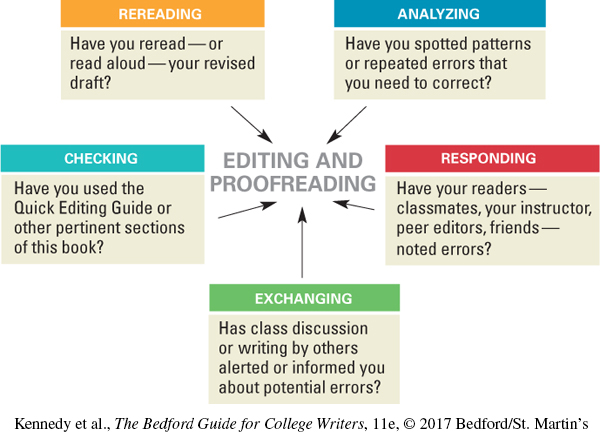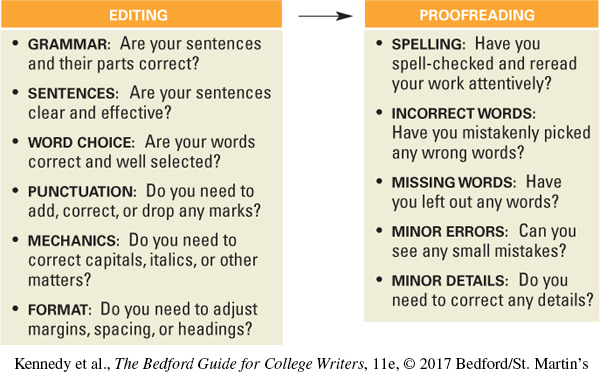Editing and Proofreading
Editing means correcting and refining grammar, punctuation, and mechanics. Proofreading means taking a final look to check correctness and to catch spelling or word-processing errors. Don’t edit and proofread too soon. As you draft, don’t fret over spelling an unfamiliar word; it may be revised out in a later version. Wait until you have revised to refine and correct. In college, good editing and proofreading can make the difference between a C and an A. On the job, it may help you get promoted. Readers, teachers, and bosses like careful writers who take time to edit and proofread.

456
Editing
As you edit, whenever you question whether a word or construction is correct, consult a good reference handbook. Learn the grammar conventions you don’t understand so you can spot and eliminate problems in your own writing. Practice until you easily recognize major errors such as fragments and comma splices. Ask for assistance from a peer editor or a tutor in the writing center if your campus has one.

Use the Quick Editing Guide to review grammar, style, punctuation, and mechanics problems typically found in college writing. Look for definitions, examples, and a checklist to help you tackle each one. Here is an editing checklist for these problems:
For help documenting any sources in your paper, see sections D and E in the Quick Research Guide.
EDITING CHECKLIST
Common and Serious Problems in College Writing
The following cross-references refer to the Quick Editing Guide.
Grammar Problems
Section Number
A1Have you avoided writing sentence fragments?
A2Have you avoided writing comma splices or fused sentences?
A3Have you used the correct form for all verbs in the past tense?
A4Do all verbs agree with their subjects?
A5Have you used the correct case for all pronouns?
A6Do all pronouns agree with their antecedents?
457
A7Have you used adjectives and adverbs correctly?
Sentence Problems
B1Does each modifier clearly modify the appropriate sentence element?
B2Have you used parallel structure where necessary?
Word Choice Problems
C1Have you used appropriate language?
C2Is your writing clean and concise?
C3Have you correctly used commonly confused words?
Punctuation Problems
D1Have you used commas correctly?
D2Have you used apostrophes correctly?
D3Have you punctuated quotations correctly?
Mechanics Problems
E1Have you used capital letters correctly?
E2Have you spelled all words correctly?
Proofreading
All writers make mistakes as they put ideas on paper. Because the mind works faster than the pencil (or the computer), a moment’s break in concentration—when someone talks or your phone rings—can lead to errors. Making such mistakes isn’t bad—you simply need to take the time to find and correct them.
Let a paper sit several days, overnight, or at least a few hours before proofreading so that you allow time to gain perspective.
Budget enough time to proofread thoroughly. For a long essay or complex research paper with a list of sources, schedule several sessions.
Ask someone else to read your paper and tell you if it is free of errors. But take pride in your own work. Don’t let someone else do it for you.
Use a dictionary or a spell-checker, but remember that a spell-checker recognizes only correct spelling, not correct choices.
Keep a list of your habitual errors, especially those your instructor has already pointed out. Double-check for these errors (such as leaving off -s or -ed endings or putting in unnecessary commas).
Proofreading does take patience but is a skill you can develop. For instance, when you simply glance at the spelling of environment, you may miss the second n. When you read normally, you usually see only the shells of words—the first and last letters. You fix your eyes on the print only three or four times per line or less. When you proofread, try to look at the letters in each word and the punctuation marks between words. Slow down and concentrate.
458
PROOFREADING CHECKLIST
Have you read your draft very slowly, looking at every word and letter? Have you tried to see what is actually written, not what you think is there?
Have you read your paper aloud so you can see and hear mistakes?
Have you read the essay backward so that you look at each word instead of getting caught up in the flow of ideas?
Have you read your essay several times, focusing each time on a specific area of difficulty? (For example, read once for spelling, once for punctuation, and once for a problem that recurs in your writing.)
Learning by Doing Reflecting on Revising and Editing
Learning by Doing Reflecting on Revising and Editing
Reflecting on Revising and Editing
Think back on your process for finishing your last paper. In what ways did you revise that paper well, working on both macro and micro changes? How might you plan to revise your next paper? In what ways did you edit your last paper well? How might you plan to edit your next paper? Working with a classmate or small group, share your successful approaches face-to-face or online.
Learning by Doing Reflecting on Past Grades and Comments
Learning by Doing Reflecting on Past Grades and Comments
Reflecting on Past Grades and Comments
Examine at least two graded pieces of writing from this class or another. What types of comments or suggestions did your instructor(s) make on your work? Did you notice that any particular issues or errors were pointed out on more than one occasion? What implications might the comments or suggestions have for how you write or revise future papers? Answer these questions in a brief reflection.